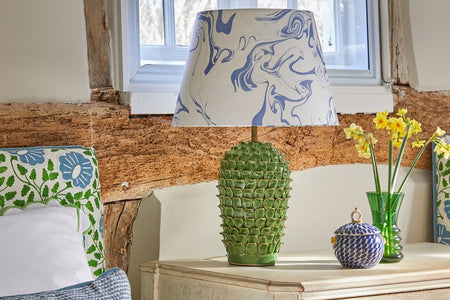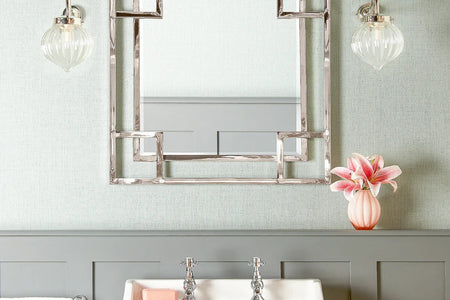
This Pooky series looks at the seven elements of interior design: space, texture, line, form, colour, pattern, and, of course, light. In this post we take you on a guided tour through pattern, looking at the fundamental pattern archetypes and giving you plenty of tips for introducing pattern into your home…
If there is one element of interior design guaranteed to express your personality, it has to be pattern. Whether you like subtlety or in-your-face maximalism, the sheer variety of patterns you can choose from and the range of colours in which they are available mean that you can add visual interest to a space in a way that is completely unique to you.
This post is our guide to some of the best-known patterns and how to use them in your design schemes. We are big fans of pattern at Pooky—classic, retro, cutting-edge contemporary, and fabulous fusions—so we have included some of our favourite patterned shades and lighting, and others that work well in patterned interiors.

The roots of pattern
The human love affair with pattern goes back tens of thousands of years. According to the Natural History Museum, the earliest known human pattern drawing is some 73,000 years old and was discovered in Blombos Cave on the southern coast of South Africa. It is a simple cross-hatch pattern—not dissimilar to a hashtag—which just goes to show that there really is nothing new under the sun. Since then, we humans have become ever more creative in our approach to patterns and pattern-making.
Here are some of the great, archetypal patterns…
Geometric patterns

A perennial favourite, and very big in the 1960s, geometric patterns include circles, rectangles, squares, triangles and a host of polygons. They are ideal if you want to create a fresh, modern or retro look.

Herringbone and chevrons

These two pattern types also have geometrical roots. Herringbone is a zigzag created by alternating diagonal lines, while chevrons consist of continuous V shapes. Both patterns add movement and sophistication to a busy space such as a hallway or living room.

Stripes

Horizontal, vertical or diagonal... As well adding visual appeal, stripes can make a space look taller or wider. Go bold and dramatic or subtle and understated.

Checks and plaids
From gingham to tartan, via houndstooth check (and many more), checks and plaids are another perennial favourite. With geometric roots, patterns of this kind can come in simple two-colour checks or more intricate multicolour plaids and varying line widths. They work well in a rustic or traditional interior and they can look sensational on tiled floors - as in this grand chequered entrance hallway by @makingspacesnet and @renovating_harrogate with Pooky’s Zeus chandelier.
Dots
Dots can be circular (or roughly circular) patterns that can be uniform or varied in size and spacing. Dots—polka and otherwise—add a playful, whimsical touch to a space.

Florals and botanicals

The natural world has been inspiring designers through the ages; flowers and other botanical elements, such as ferns, lend themselves to realistic and abstract depictions. They remained a strong feature of country house style and are a key element of 21st century maximalism. As well as adding a touch of nature, floral patterns can bring elegance and softness to your surroundings.
Animal Prints

Animals and reptiles such as leopards, snakes, tigers and zebras have long inspired textiles, wallpaper and accessories. Animal prints are ideal if you want to add exotic and bold design elements to your home.
Paisley

Despite its distinctly Scottish name, paisley’s roots date back to 11th century Kashmir. It is a combination of a distinctive teardrop motif that features intricate designs, and is often used in textiles and wallpapers (and Pooky lampshades!) If you want to add a hint or a generous serving of bohemian, eclectic or vintage style, you cannot go wrong with paisley.
Ikat

Ikat is an historic pattern-making technique that dates back many hundreds of years to central Asia. Ikat fabrics have a slightly blurred, tie-dye look and, if you are keen on the global, handcrafted look, they will be perfectly at home in your surroundings. (Read our interior design lover’s guide to ikat lampshades here.)
Abstract patterns

These are non-representational shapes and forms that create unique artistic designs. They can be highly creative and modern, and will bring a sense of the avant-garde to any room. That said, the abstract patterns formed by techniques such as hand-marbling and shibori date back hundreds of years…
Pattern in your home—our top 5 tips

Whether you are a pattern novice or seasoned practitioner, here are our top tips for using pattern effectively in your home:
1) Small steps
Introducing pattern into small areas such as curtains, lampshades, pillows, rugs, or throws is a good starting point, allowing you to experiment without overwhelming a space.
2) Layering pattern
A trick for successful layering is to group different patterns within the same colour family. Striped curtains and floral cushions, for example, with a unifying colour, will give a room a cohesive yet varied look. Use patterns of different scales for harmony and balance.
3) Patterned furniture
To create a focal point in a room, add a patterned furniture piece, such as an upholstered chair, sofa, or ottoman, for a bold statement.

4) A sense of balance
To avoid any hint of clutter, balance patterned items with solid colours. For example, block-coloured furniture or large surfaces, such as floors or walls, will ground any patterned elements.
5) Scaling up or down
Make sure that pattern scales suit the space; the larger the room, the larger the pattern. Similarly, scale down for smaller rooms.

Checks and lemons make for contrasting patterns in a complementing yellow, in this bedroom by Amara. Image @thepajaamahub
Patterned lampshades: the choice is yours!
If you are looking for patterned lampshades, you will find dozens of fabulous Pooky patterns from florals to fishtails, contemporary to contrasting here. We have your pattern preferences covered!

And, finally, if you want to delve as deeply as possible into the subject, we recommend The V&A Sourcebook of Pattern & Ornament. Richly illustrated and easy to navigate, it offers more than 1,000 historic examples of pattern and ornamentation from around the world.
Pooky makes beautiful, affordable designer lighting for beautiful rooms. Browse our full range of lamps, shades and more.
See also:
The Seven Elements of Interior Design: Space
The Seven Elements of Interior Design: Texture
The Seven Elements of Interior Design: Line
The Seven Elements of Interior Design: Colour
The Seven Elements of Interior Design: Form
Image top: Barlow & Barlow










